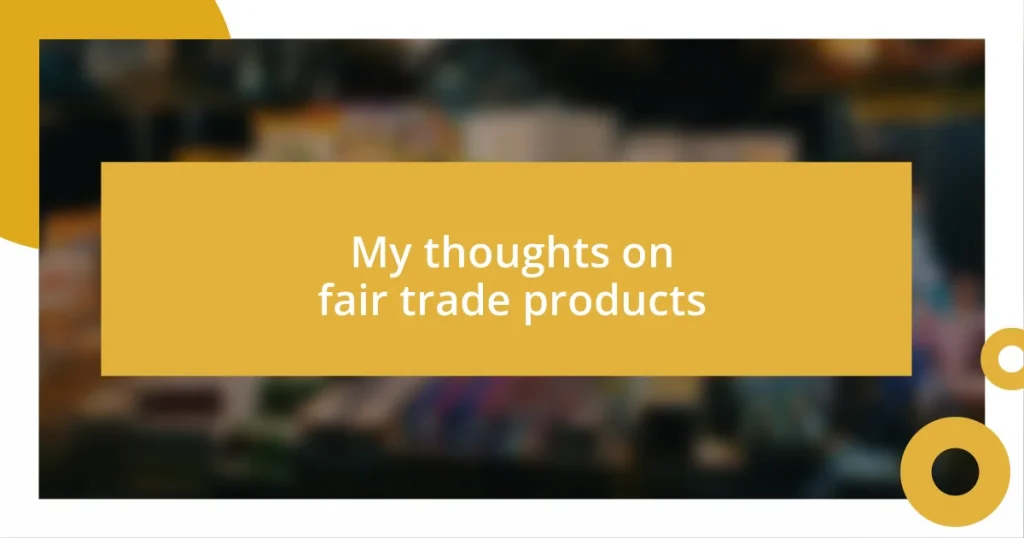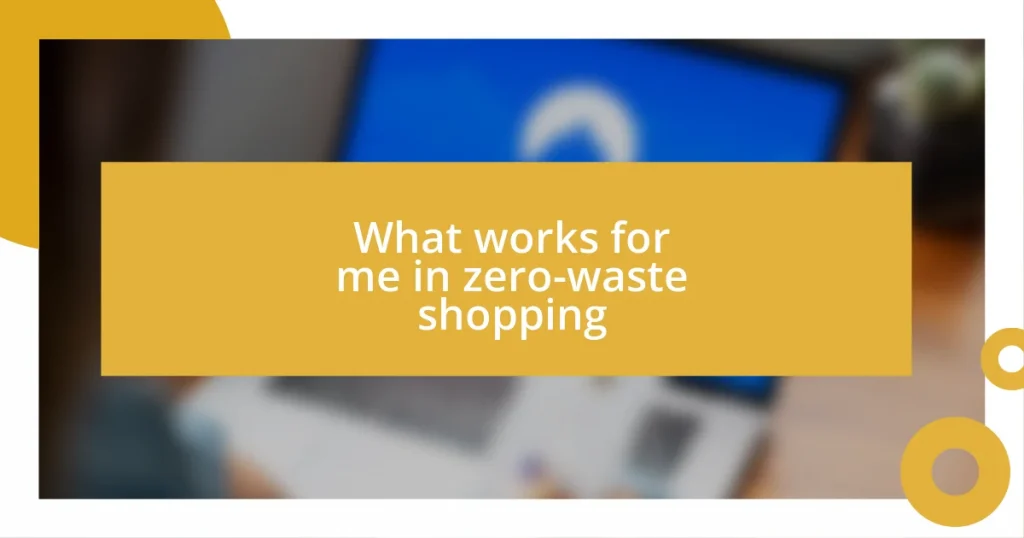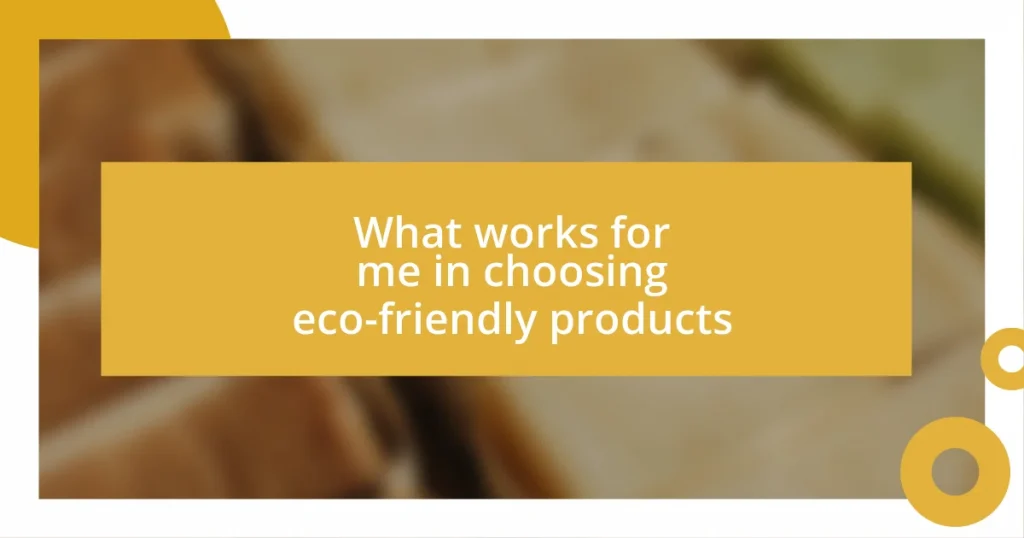Key takeaways:
- Fair trade products promote social justice by ensuring fair wages and safe working conditions for farmers, while fostering a connection between consumers and producers.
- Ethical consumption empowers consumers to support sustainable practices and community development, transforming shopping into an opportunity for positive change.
- Sharing experiences with fair trade can inspire others and build a community of informed consumers, encouraging a collective commitment to ethical choices.
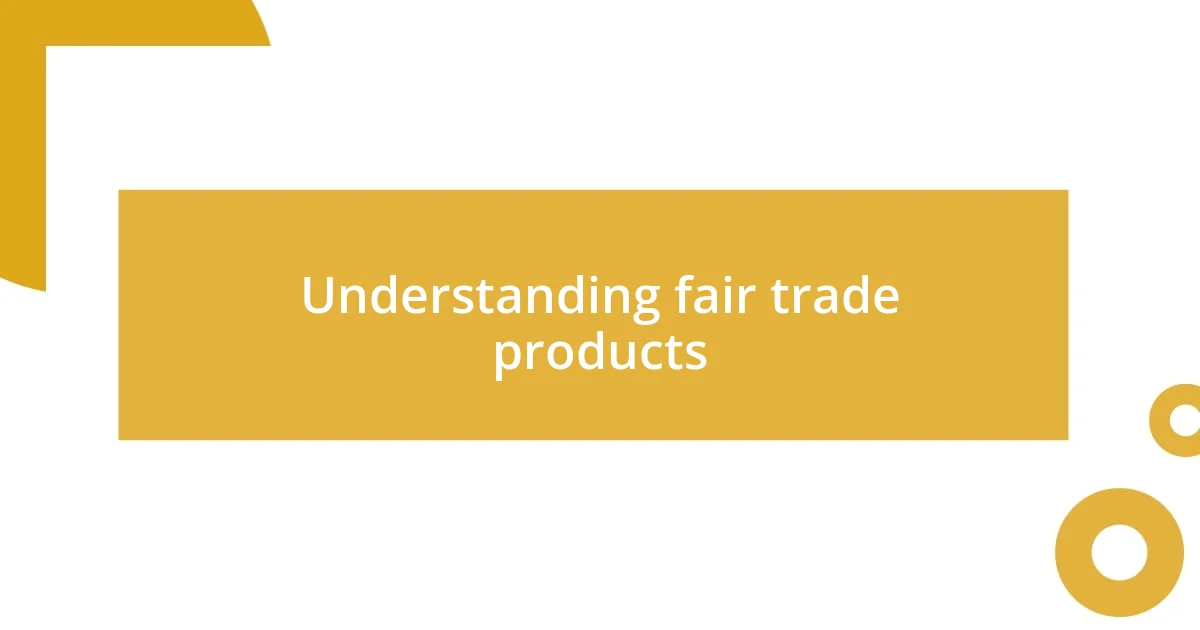
Understanding fair trade products
Fair trade products embody a commitment to social justice and sustainable practices. When I first discovered fair trade coffee, I was curious about what made it special. The more I learned, the more I realized that each purchase goes beyond mere consumption; it’s an investment in the well-being of farmers and communities who strive for fair wages and safe working conditions.
I remember the first time I sipped fair trade chocolate while learning about its origins. It felt rewarding to know that my choice supported ethical farming practices rather than exploitative ones. This connection between consumer and producer is what makes fair trade so compelling; it fosters a sense of responsibility and shared humanity. Have you ever considered how your everyday choices impact lives halfway around the world?
Understanding fair trade products also means recognizing the standards and certifications that define them. Organizations like Fair Trade International set strict criteria for what qualifies as fair trade, ensuring transparency and accountability. I find it fascinating how these guidelines not only create better market conditions but also empower producers to have a voice in their industries—an aspect that profoundly resonates with me as I think about the broader implications of ethical consumption.
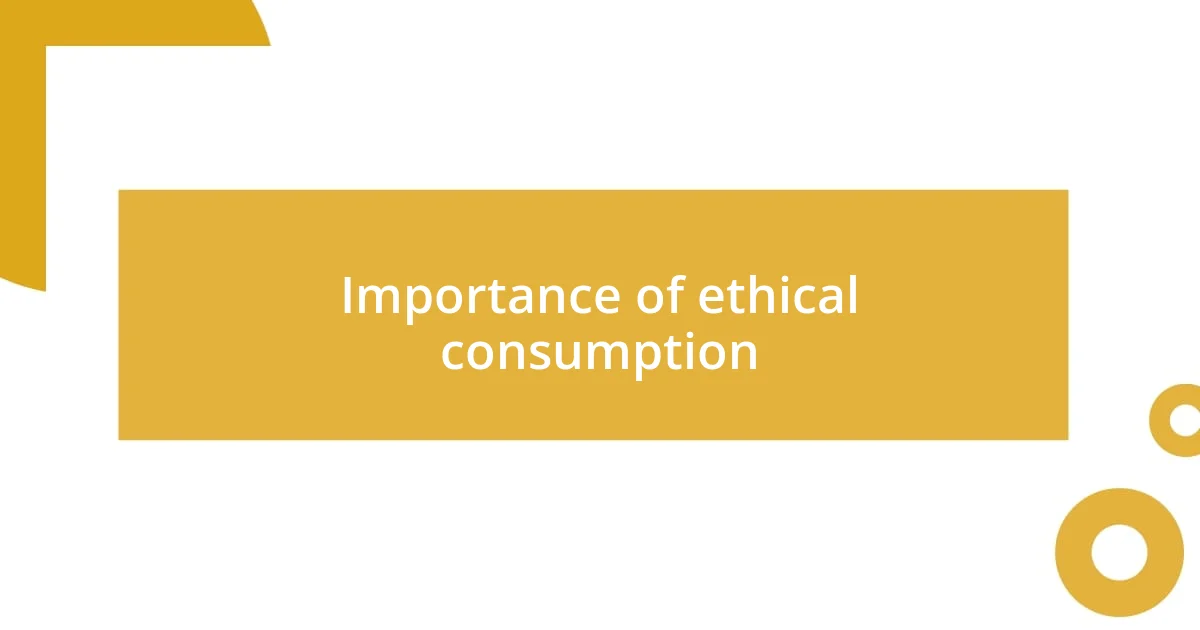
Importance of ethical consumption
Ethical consumption is crucial because it reflects our values and impacts global communities. I recall standing in the grocery store, contemplating between a regular tea brand and a fair trade option. Opting for the fair trade package felt empowering; it was more than just a drink—it was a choice that supported environmental sustainability and fair labor practices. Every time we decide to choose ethically, we contribute to a larger movement toward justice and equality.
When we consume ethically, we encourage businesses to adopt sustainable practices. I remember sharing a meal with friends who were skeptical about spending a bit more on fair trade products. After a lively discussion on the positive impact these purchases can have, they decided to try fair trade snacks with us. Their surprise at the quality and taste—combined with the knowledge that they were supporting farmers and the environment—made them enthusiastic supporters of ethical consumption.
Moreover, ethical consumption fosters a connection between consumers and producers that transcends geographical boundaries. I’ve felt humbled when I learned more about the farmers growing coffee in Colombia or cacao in Ghana. Recognizing the daily struggles they endure, while I simply enjoy their products, is a wake-up call. That realization alone can reshape how I shop and engage with brands. It transforms shopping from a mundane task into an opportunity to support genuine, positive change.
| Aspect | Traditional Consumption | Ethical Consumption |
|---|---|---|
| Impact on Producers | Often exploitative | Supports fair wages and working conditions |
| Environmental Considerations | Minimal focus on sustainability | Emphasizes eco-friendly practices |
| Consumer Awareness | Limited knowledge | Empowered and informed choices |
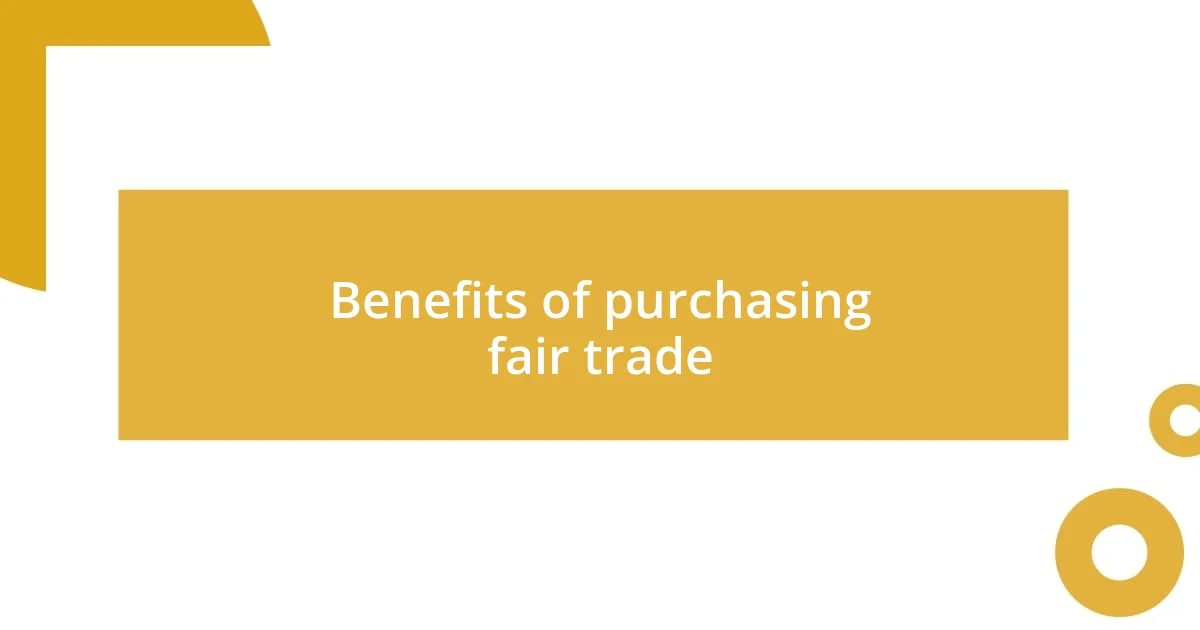
Benefits of purchasing fair trade
Purchasing fair trade products offers a multitude of benefits that go beyond just being a consumer. For me, the most striking advantage is the profound sense of connection I feel to the artisans and farmers behind the products. I remember when I tried fair trade bananas for the first time. There was something special about knowing that the price I paid directly contributed to better living conditions for the farmers. It’s a feeling of empowerment; my choice can catalyze change, and that’s incredibly fulfilling.
Here are some key benefits of purchasing fair trade:
- Fair Wages: Ensures farmers receive a living wage, lifting them out of poverty.
- Community Development: Funds from fair trade support local projects, from schools to healthcare.
- Sustainable Practices: Promotes environmentally friendly farming techniques that protect ecosystems.
- Empowerment: Gives producers a voice in global markets, fostering self-sufficiency.
- Quality Assurance: Often, fair trade products undergo strict quality checks, leading to superior quality.
Each of these benefits resonates with me, showing how every fair trade purchase is a step towards a better world. It’s not just about making a purchase; it’s about making a positive impact.
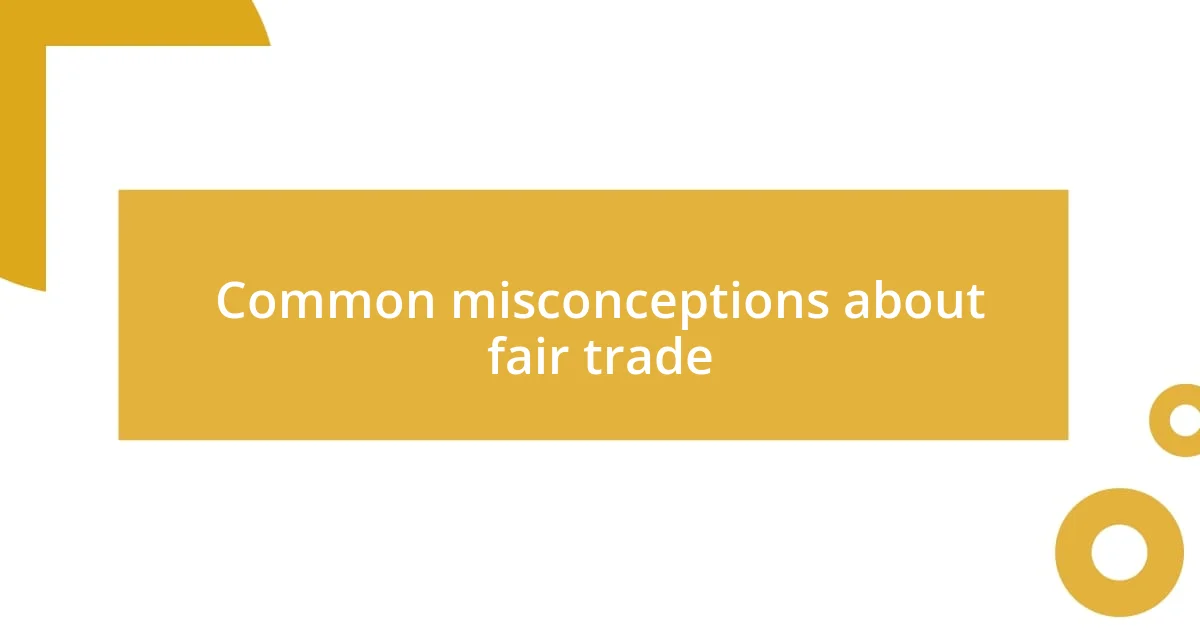
Common misconceptions about fair trade
One common misconception about fair trade is that it simply means a higher price without any real benefits. I remember when I first introduced friends to fair trade chocolate; they were surprised to learn that the extra cost directly supports better wages and working conditions for farmers. Isn’t it amazing how that little price difference creates such a significant change in someone’s life?
Another point of confusion is the assumption that all fair trade products are of inferior quality. In my experience, fair trade items often have a distinct richness and flavor that outshines conventional alternatives. I still think back to that fantastic fair trade coffee I brewed one Sunday morning—it was a game changer. Wouldn’t you agree that quality should go hand-in-hand with ethical sourcing?
Lastly, many people believe that fair trade only benefits a small number of producers. However, the ripple effect touches entire communities. I’ll never forget reading about a cooperative in Peru that used fair trade profits to build a school. Just imagine that—your morning brew potentially funding education for local children! This broader impact transforms our everyday choices into powerful tools for change.
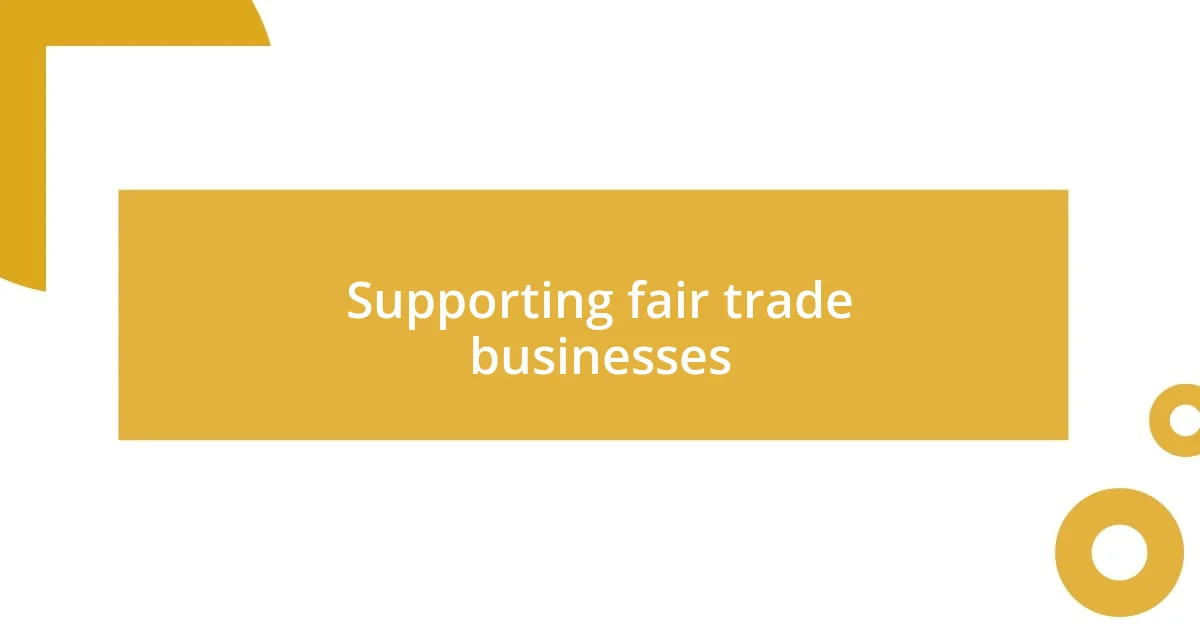
Supporting fair trade businesses
Supporting fair trade businesses goes beyond just choosing ethical products; it’s a way to actively participate in shaping a fairer global economy. When I discovered a local fair trade shop, I felt a thrill that came from knowing my purchases were helping small-scale farmers and artisans directly. Have you ever thought about how every dollar spent can create opportunities for someone halfway across the globe? It really hits home when I see the stories of the people behind the products I buy.
Every time I choose fair trade, I reflect on the power of conscious consumerism. In my own life, I’ve noticed how buying a fair trade t-shirt not only supports the craftspeople but also starts conversations with my friends about the importance of ethical fashion. Have you ever found yourself explaining the journey of your favorite fair trade coffee while sipping it together? Sharing these stories connects us and spreads awareness.
Moreover, supporting fair trade businesses fosters a sense of community that transcends borders. I recall attending a local fair trade festival where I met several artisans. Their passion for their craft was contagious, and it reminded me that my support directly impacts their lives. Isn’t it wonderful to think that each purchase can ripple outwards, supporting families and entire communities? When we embrace fair trade, we become part of a larger narrative dedicated to justice and sustainability.
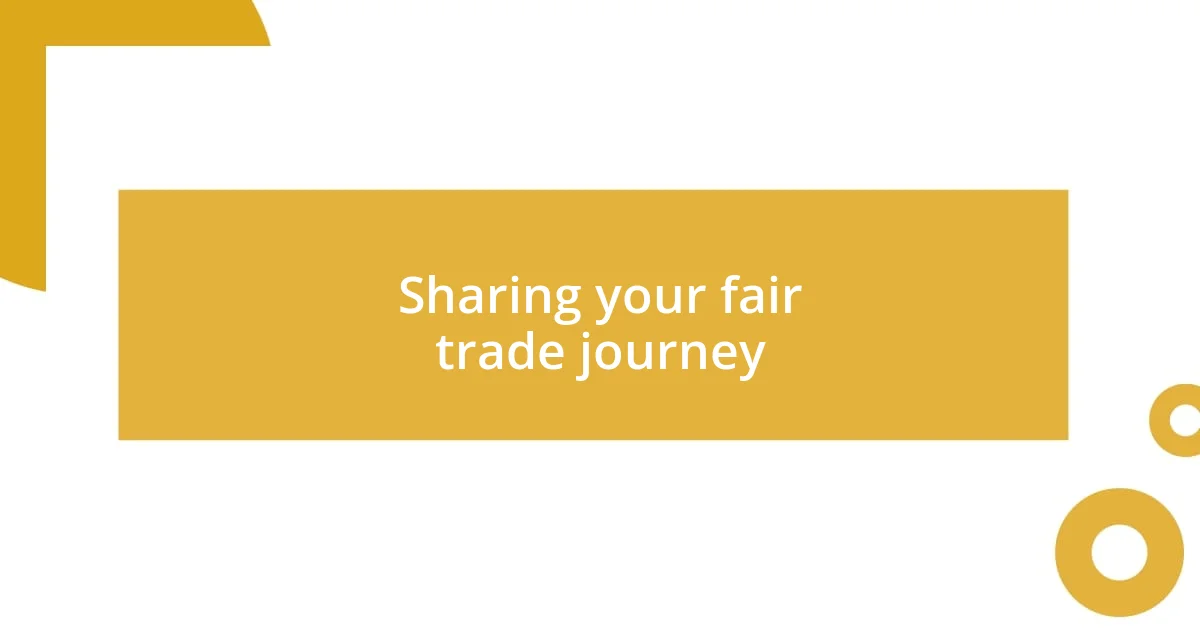
Sharing your fair trade journey
Sharing your journey with fair trade products can be incredibly rewarding and eye-opening. I remember the first time I attended a workshop on fair trade; I met a farmer from Uganda whose face lit up as he described the differences fair trade made in his community. It was enlightening to witness firsthand how our choices can empower individuals and uplift entire villages. Don’t you just love moments like that when everything clicks into place?
As I began to incorporate fair trade items into my daily life, I felt a real sense of connection to people across the globe. I started sharing my experiences through social media, celebrating the stories behind my favorite fair trade purchases. One post showcasing beautifully handwoven baskets sparked a lively discussion among my friends, leading many of them to explore their own fair trade journeys. Have you ever shared a product story and realized you could inspire others to make a difference, too?
Reflecting on my path, I’ve learned that sharing fair trade insights is also about being honest. There were times I struggled with the price of fair trade goods, questioning if I could justify spending more. But then I thought of the positive impact on lives and communities. By being transparent about those challenges, I encouraged others to think critically about the choices we make and their far-reaching consequences. Doesn’t it feel empowering to know that sharing your journey can help foster a community of informed consumers?










